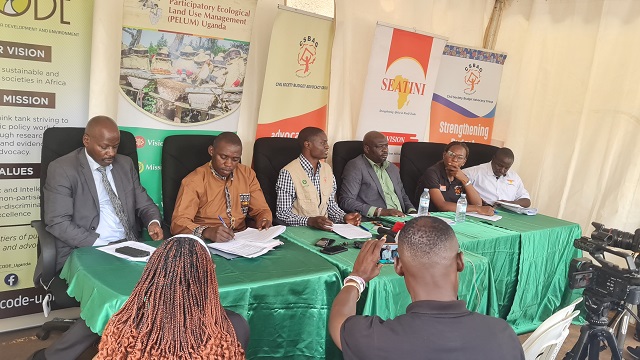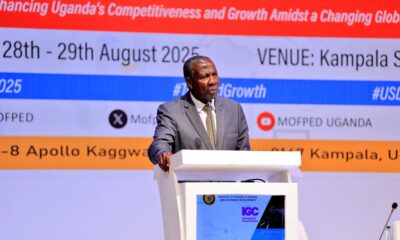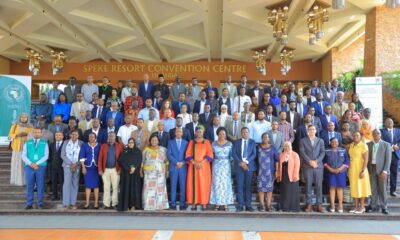Economy
CSOs Urge Fiscal Prudence, Improved Execution Ahead of Uganda’s Budget Speech
As Minister of Finance Matia Kasaija prepares to present Uganda’s national budget for the Financial Year 2025/26 on June 12, civil society organizations (CSOs) have issued a compelling call for greater fiscal discipline, enhanced budget execution, and tangible improvements in service delivery.
The Civil Society Budget Advocacy Group (CSBAG), in a press briefing held on June 8 in Ntinda, Kampala, provided a detailed analysis of the approved budget, highlighting both commendable aspects and critical areas of concern.
CSBAG lauded several progressive tax reforms, including income tax exemptions for start-ups during their initial three years. The group also welcomed the adoption of 47% of their proposals into the final budget, particularly noting significant alignment in programs like Development Plan Implementation (71%) and Agro-Industrialisation (66.7%). However, they cautioned that without robust project preparation, accountability, and improved implementation, the budget risks failing to achieve its ambitious development goals.
A key recommendation from CSBAG emphasizes the strict enforcement of pre-feasibility and feasibility studies before initiating infrastructure projects. The group highlighted a concerning trend where 15 out of 49 loan-funded projects between FY2018/19 and FY2023/24 lacked these crucial assessments, leading to widespread cost overruns and delays.
Furthermore, CSBAG urged the government to improve the absorption of approved funds, especially at the local government level. They pointed to substantial unspent funds from the previous year, including Shs 463.77 billion under the USMID program and Shs 89.3 billion under UgIFT. Concurrently, they pressed for the prioritization of pending contractor payments, warning that delays have stalled critical road projects, such as the Busabala Flyover, thereby compromising public safety.
Reforms in credit access initiatives, including the Small Business Recovery Fund and Parish Development Model, were also advised by CSBAG. They underscored the necessity for effective recovery and reinvestment strategies to ensure the sustainability and impact of these vital funds.
While acknowledging the budget’s alignment with Uganda’s Fourth National Development Plan (NDP IV), CSBAG expressed significant concern over a Shs 1.2 trillion shortfall in funding for the priority ATMS sectors (Agro-industry, Tourism, Minerals, and Science and Technology). These sectors received only 5% of the total budget, falling short of the 7% target and potentially jeopardizing Uganda’s ambitious target to tenfold its GDP by 2040.
Equally troubling is the escalating public debt burden, which now stands at Shs 107 trillion. A significant 53.34% of GDP is earmarked for debt servicing, exceeding the government’s own 50% target. Interest payments alone are projected to consume Shs 9.44 trillion, representing a substantial 25.4% of total revenue.
The CSOs also brought attention to persistent fiscal indiscipline, evidenced by unsanctioned supplementary budgets and a sharp increase in domestic arrears—from Shs 10.5 trillion in FY2022/23 to Shs 13.8 trillion in FY2023/24. Despite an allocation of Shs 1.4 trillion for arrears clearance, new payables are accumulating faster than repayments, creating a continuous backlog.
On the social front, CSBAG raised alarms over a slight decline in funding for essential medicines under the National Medical Stores and an overall reduction of Shs 9.8 billion in the budget for the Ministry of Education and Sports. These cuts, the group warned, could exacerbate existing service delivery gaps, particularly given declining donor support in the health sector and recent mergers of agricultural agencies under the Ministry of Agriculture.
In light of these constraints, CSBAG called for a critical realignment of fiscal priorities to boost local government financing, support tourism development, and strengthen the manufacturing sector. Despite tourism’s growing contribution to GDP—rising from 4.7% in 2022 to 6.6% in 2024—the sector received only Shs 427.59 billion, significantly less than the NDP IV proposal.
These recommendations arrive at a pivotal moment for Uganda. With the upcoming budget set to define the first year of NDP IV and a new post-2026 government on the horizon, CSBAG underscored that true success hinges not merely on the figures allocated, but on the efficient and impactful utilization of every shilling.
Comments

























